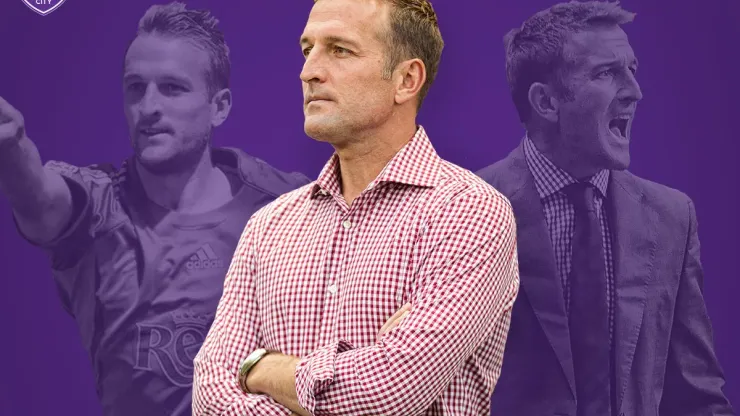When Jason Kreis announced that he was leaving Real Salt Lake to become the first manager of New York City FC after the 2013 MLS season, he said part of him wanted to take the type of risk he never got around to taking during his playing career.
It was an admirable and perfectly understanding sentiment from a man who scored 108 MLS goals but never tested himself overseas or played in the World Cup.
But the risk – as risks are wont to do – backfired. Consistently undercut by upper management and unable to find a winning formula for his expansion team, Kreis was unceremoniously fired last November after just a single season in New York.
But Kreis, who won 102 games and an MLS Cup while turning small-market RSL into the league’s most stylistically advanced club from 2007 to 2013, was never going to be unemployed for long.
One failure, especially one with the kinds of mitigating circumstances Kreis had at NYCFC, never damages reputations beyond repair.
You can fail once. Two failures, though, is an entirely different story. That’s why Kreis’ decision to replace Adrian Heath and jump back into MLS management with Orlando City is a slightly surprising one.
Considering his recent experience, you’d think Kreis – who could afford to be fairly choosy – would opt for a relatively stable situation.
Orlando is not that.
Last December, the club’s Brazilian owner Flavio Augusto da Silva hired former Benfica executive Armando Carneiro as the club’s Chief Soccer Officer – undercutting the established GM Paul McDonough, who latched on with Atlanta United.
Then, less than two months after being hired, Carneiro was gone too – citing personal reasons and leaving soccer operations in the hands of founder and co-owner Phil Rawlins.
Heath, who had assistant coach and former Orlando City player Ian Fuller fired out from under him during the offseason, never had much of a chance once the institutional musical chairs started.
Didn’t matter that Heath had been at the club since its inception in 2011, and with the organization since its inception in Austin as the Aztecs in 2008. It also didn’t matter that Orlando’s front office work this year – Antonio Nocerino and Julio Baptista, for instance – was decidedly unhelpful.
Rawlins’ future may not be entirely secure either. The former Stoke City owner has dismissed rumors that he too could be on his way out, but the club’s increasingly Brazilian-centric feel since the end of last season isn’t a coincidence.
You only have to assume that Kreis has had assurances that he’s going to be able to do his job without interference. He flew to Portugal to meet with da Silva before taking the job, and appears to have been the number one target of Rawlins’ all along.
And absolutely, there’s plenty to like about managing Orlando. It’s a big club. They’ve got fantastic support, a beautiful new stadium opening next year, and every opportunity to make the playoffs in a weak Eastern Conference this season.
The Lions have talent. Cyle Larin, Tommy Redding, Cristian Higuita, Darwin Ceren, Brek Shea, and Kevin Molino form an exciting young core. If Kaka is healthy – and happy – he’s not bad either.
But this is some kind of professional risk from the man whose last professional risk didn’t quite pan out – and it’s not like Kreis’ only brush with front office dysfunction was in New York.
Kreis’ governing principle, Audentis Fortuna Juvat – Fortune Favors The Brave – wasn’t the only reason he made the leap to NYCFC at the end of 2013. By that point, things had soured in Salt Lake.
Dell Loy Hansen – who has since firmly established himself as one of the league’s worst owners – had taken over from Dave Checketts, played hardball with Kreis’ contract, and alienated many at the club. Kreis bolted. GM Garth Lagerway would follow him out the door just a year later.
RSL has been predictably underwhelming since Kreis left. They were pasted 5-0 by Landon Donovan’s Los Angeles Galaxy in a Western Conference Semifinal in 2014, and missed the playoffs for the first time since 2007 last year.
It’s not exactly groundbreaking that supportive, stable, common sense management helps win games. Kreis has been forced to learn that the hard way.
Hats off to him for taking this job. In going to Orlando – instead of waiting to reunite with Lagerway in Seattle, or heading up what is looking like a very impressive organization in Atlanta – Kreis is betting on himself.
If anyone can succeed in Orlando, it’s him.
Good for Rawlins, too. He said he wanted his next coach to have MLS experience and an attacking, possession-oriented philosophy, and he got his man. Orlando’s future is now brighter than it has been at any point this year.
But hiring the right coach isn’t a cure-all. This franchise has been a mess over the last eight months, and almost none of the foundational problems wrecking havoc had to do with Adrian Heath.
It is encouraging that da Silva didn’t, as was expected in some quarters, insist on a big-name foreign coach. But there’s no doubt that, coming off of the first major failure of his career, Kreis has thrown himself into the deep end again.
200+ Channels With Sports & News
- Starting price: $33/mo. for fubo Latino Package
- Watch Premier League, Women’s World Cup, Euro 2024 & Gold Cup
The New Home of MLS
- Price: $14.99/mo. for MLS Season Pass
- Watch every MLS game including playoffs & Leagues Cup
Many Sports & ESPN Originals
- Price: $10.99/mo. (or get ESPN+, Hulu & Disney+ for $14.99/mo.)
- Features Bundesliga, LaLiga, Championship, & FA Cup
2,000+ soccer games per year
- Price: $5.99/mo
- Features Champions League, Serie A, Europa League & Brasileirāo
175 Premier League Games & PL TV
- Starting price: $5.99/mo. for Peacock Premium
- Watch 175 exclusive EPL games per season






